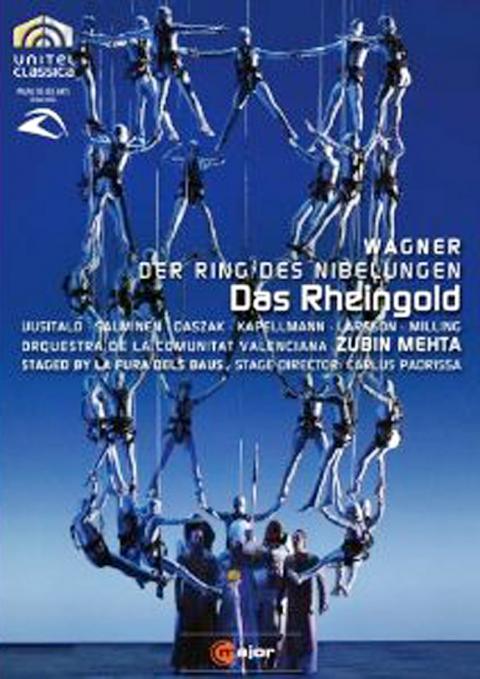Far and away the most exciting classical DVDs I reviewed in 2011 were the Wagner Ring operas from Valencia, Spain (C Major; reviewed on Aug. 14). Conducted by Zubin Mehta, and choreographed by La Fura dels Baus (which staged the opening ceremony of the Barcelona Olympics), these DVDs finally broke with the postmodern, euro-trash habit of mocking these late-Romantic masterpieces with a spurious modernization.
Instead, we had all the mystery of the ancient Nordic legends combined with high-tech projections and the gods singing from the top of electronic fork-lift towers, while the Fura dels Baus figures writhed on the ground as the Rhine gold itself and crossed the stage suspended on hooks like meat carcasses in Alberich’s underground workshop.
These DVDs — seven, plus one devoted to “the making of …” — seemed stylistically new, but in reality they revived the original magic and mystery that Wagner wanted, and the early productions strove to attain. A bargain-priced highlights disk is also available.

Photo Courtesy of C Major
Staying with opera, and with Wagner, the Lohengrin (Decca; reviewed on March 13) starring Jonas Kaufmann and conducted by Kent Nagano managed to be memorable despite its bizarre 1930s staging by Richard Jones. The reason it is so fine has a lot to do with Kaufmann, who quickly proceeded to sing the same role (Lohengrin) at Bayreuth, plus Siegfried in New York, and the intense musicality of Nagano and the Bayerisches Staatsorchester.
The production, by contrast, had a Nazi-style militia, the ongoing construction center-stage of a honeymoon house, and much more directorial interference with the natural dynamics of the piece. Some will consequently judge this version distasteful, but the singing is very fine, as is the orchestral playing, and the video’s production values are very high.
Verdi’s Don Carlo (EMI; reviewed on May 9) is the Italian version of the opera he originally wrote in French as Don Carlos. The London production, conducted by Antonio Pappano and starring Rolando Villazon, Marina Poplavskaya and Simon Keenlyside, proved exceptionally strong.

Photo Courtesy of SONY
There’s a push nowadays to have this opera accepted as one of Verdi’s greatest achievements, maybe even his masterpiece, and though I can’t agree with that evaluation, this was just the production, traditional and forthright, to support such a claim.
Lang Lang Live in Vienna (Sony Classical; reviewed on Feb. 13) is a lovable performance featuring two Beethoven sonatas, some Albeniz, a Prokofiev sonata, and three Chopin encores. Lang Lang’s (郎朗) charm easily overcame any initial reservations in this citadel of classicism. Meanwhile, Claudio Abbado continued to show his mastery of Mahler’s unique mystique with his beautiful recording of the First Symphony (EuroArts; reviewed on Feb. 13). Yuja Wang (王羽佳) played Prokofiev’s Third Piano Concerto, also to great effect, in the same program.

Under pressure, President William Lai (賴清德) has enacted his first cabinet reshuffle. Whether it will be enough to staunch the bleeding remains to be seen. Cabinet members in the Executive Yuan almost always end up as sacrificial lambs, especially those appointed early in a president’s term. When presidents are under pressure, the cabinet is reshuffled. This is not unique to any party or president; this is the custom. This is the case in many democracies, especially parliamentary ones. In Taiwan, constitutionally the president presides over the heads of the five branches of government, each of which is confusingly translated as “president”

Sept. 1 to Sept. 7 In 1899, Kozaburo Hirai became the first documented Japanese to wed a Taiwanese under colonial rule. The soldier was partly motivated by the government’s policy of assimilating the Taiwanese population through intermarriage. While his friends and family disapproved and even mocked him, the marriage endured. By 1930, when his story appeared in Tales of Virtuous Deeds in Taiwan, Hirai had settled in his wife’s rural Changhua hometown, farming the land and integrating into local society. Similarly, Aiko Fujii, who married into the prominent Wufeng Lin Family (霧峰林家) in 1927, quickly learned Hoklo (commonly known as Taiwanese) and

The Venice Film Festival kicked off with the world premiere of Paolo Sorrentino’s La Grazia Wednesday night on the Lido. The opening ceremony of the festival also saw Francis Ford Coppola presenting filmmaker Werner Herzog with a lifetime achievement prize. The 82nd edition of the glamorous international film festival is playing host to many Hollywood stars, including George Clooney, Julia Roberts and Dwayne Johnson, and famed auteurs, from Guillermo del Toro to Kathryn Bigelow, who all have films debuting over the next 10 days. The conflict in Gaza has also already been an everpresent topic both outside the festival’s walls, where

The low voter turnout for the referendum on Aug. 23 shows that many Taiwanese are apathetic about nuclear energy, but there are long-term energy stakes involved that the public needs to grasp Taiwan faces an energy trilemma: soaring AI-driven demand, pressure to cut carbon and reliance on fragile fuel imports. But the nuclear referendum on Aug. 23 showed how little this registered with voters, many of whom neither see the long game nor grasp the stakes. Volunteer referendum worker Vivian Chen (陳薇安) put it bluntly: “I’ve seen many people asking what they’re voting for when they arrive to vote. They cast their vote without even doing any research.” Imagine Taiwanese voters invited to a poker table. The bet looked simple — yes or no — yet most never showed. More than two-thirds of those